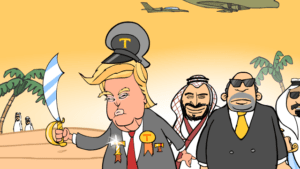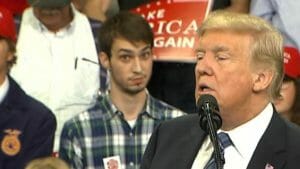King George Loses His Crown
In his quest to expand presidential authority, George W. Bush has claimed extraordinary powers, whether to imprison American citizens without charge or ignore the laws of nature. The Supreme Court's ruling on the EPA is a breath of fresh air, not just for the environment but for our democracy.WASHINGTON — A great gust of common sense has blown away the rhetoric that obscures the president’s soft-on-polluters policy with slogans such as “Clear Skies.” The Supreme Court decision demanding that the Environmental Protection Agency take steps to regulate emissions that are linked to global warming is a victory for Mother Earth. And much, much more.
The high court issued another unequivocal reprimand to the Bush administration’s ceaseless arguments that the president can ignore or circumvent any law of his choosing, and make up out of whole cloth an alternate set of rules.
The substance of the environmental case was simple: The Bush administration, in its ideological war against regulation in general and its refusal to acknowledge the scientific evidence of global warming in particular, subverted the Clean Air Act by having the EPA abandon its mandate to treat certain auto emissions as air pollutants. All the usual weasel words the administration uses when it wants to get its way — that there is some overarching presidential power to replace laws and congressional requirements with the political judgments it prefers — were swept away.
When Congress required the EPA to use its judgment in assessing the danger of air pollutants, Justice John Paul Stevens wrote for the court’s 5-4 majority, it meant the judgment had to be applied based on facts about the public’s health and welfare. The agency’s decisions, the court said, were to be made “within defined statutory limits.”
“Put another way,” Stevens wrote, “the use of the word ‘judgment’ is not a roving license to ignore the statutory text.”
There is nothing new about such roving adventures. President Bush has undertaken them for the past six years.
He has asserted his right to exercise grossly excessive powers, including the power to imprison American citizens indefinitely and without charge; to use abusive interrogation techniques that are barred by U.S. and international laws; to eavesdrop on Americans’ phone calls without a warrant. Bush has issued hundreds of “signing statements” in which he approves legislation overall but singles out provisions he simply has decided not to obey.
Alleged terrorists aren’t the only targets. According to research published by The Boston Globe last year, Bush has decreed that he won’t follow certain affirmative action rules, that he can order the Justice Department to withhold information from Congress, that he can tell a scientist not to give Congress the results of government-funded research. Bush has declared that only he can decide whether certain government and contracting whistleblowers can provide information to Congress — despite an explicit congressional mandate that they come forward without fear of being fired.
Aziz Z. Huq, co-author with Frederick A.O. Schwarz Jr. of “Unchecked and Unbalanced,” a book that examines Bush’s assertions of presidential power, says the White House even has ignored a 2002 law that requires it to disclose when it has refused to follow a statute because the president considered that law unconstitutional.
“With very few exceptions, it’s the job of the executive branch to take care that the laws are followed,” Huq says. “In a wide variety of areas, what you’ve seen is a resistance to doing that.”
With respect to Bush’s policy of detaining accused terrorists without charge or trial, the Supreme Court already has rebuked him twice. But his disdain for the court appears to be undiminished.
After its EPA ruling, Bush effectively reiterated his intent to do little about global warming — he pointedly failed to say he would order the environmental agency to get moving. Instead, the president rehashed an argument for inaction, saying that there must be international progress on climate change first. This is an assertion the administration made in its legal arguments — and the Supreme Court had just explicitly rejected it. The president’s “broad authority” in foreign affairs, Stevens wrote, “does not extend to the refusal to execute domestic laws.”
We are left to address a political crisis that grows ever more bizarre. Bush’s contempt for Congress only has deepened since the Democrats won control of Capitol Hill. His apparent disdain for Supreme Court rulings has been given less notice. Ordinarily, a president with a habit of lawlessness would be impeached. There is little political will for this, the nation having only recently endured an impeachment over the excruciatingly inconsequential offense of lying about sex.
Once the clock finally runs out on the Bush presidency, we may well uncover more affronts to the law and the Constitution. And we will wonder, perhaps, why we let them go on.
Marie Cocco’s e-mail address is mariecocco(at symbol)washpost.com.
© 2007, Washington Post Writers Group
Your support matters…Independent journalism is under threat and overshadowed by heavily funded mainstream media.
You can help level the playing field. Become a member.
Your tax-deductible contribution keeps us digging beneath the headlines to give you thought-provoking, investigative reporting and analysis that unearths what's really happening- without compromise.
Give today to support our courageous, independent journalists.






You need to be a supporter to comment.
There are currently no responses to this article.
Be the first to respond.